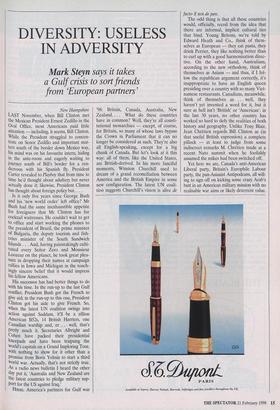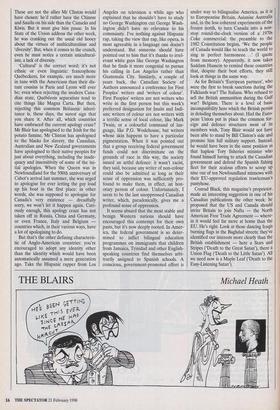DIVERSITY: USELESS IN ADVERSITY
Mark Steyn says it takes
a Gulf crisis to sort friends from 'European partners'
New Hampshire LAST November, when Bill Clinton met the Mexican President Ernest Zedillo in the Oval Office, most Americans paid little attention — including, it seems, Bill Clinton. While the President struggled to concen- trate on Senor Zedillo and important mat- ters south of the border down Mexico way, Ills mind was on his favourite intern, hiding In the ante-room and eagerly waiting to journey south of Bill's border for a ren- dezvous with his Spanish fly. President Carter revealed to Playboy that from time to time he'd thought about adultery but never actually done it; likewise, President Clinton has thought about foreign policy but. . . .
Is it only five years since George Bush and his 'new world order' left office? Mr Bush had the same inexhaustible appetite for foreigners that Mr Clinton has for cocktail waitresses. He couldn't wait to get to office and start working the phones to the president of Brazil, the prime minister of Bulgaria, the deputy tourism and fish- eries minister of the South Sandwich Islands . . . And, having painstakingly culti- vated every Setior Zero and Monsieur Loozeur on the planet, he took great plea- sure in dropping their names at campaign rallies in Iowa and Michigan in the touch- ingly sincere belief that it would impress his fellow Americans.
His successor has had better things to do with his time. In the run-up to the last Gulf conflict, President Bush got the French to give aid; in the run-up to this one, President Clinton got his aide to give French. So, when the latest UN coalition swings into action against Saddam, it'll be a zillion American B52s, 14 British Harriers, one Canadian warship and, er . . . well, that's pretty much it. Secretaries Albright and Cohen have packed their presidential kneepads and have been traipsing the world's capitals on a Grand Imploring Tour, With nothing to show for it other than a promise from Boris Yeltsin to start a third world war. Actually, that's not strictly true. As a radio news bulletin I heard the other day put it, 'Australia and New Zealand are the latest countries to pledge military sup- port for the US against Iraq.' Hmm. America's partners for Gulf war '98: Britain, Canada, Australia, New Zealand. . . . What do these countries have in common? Well, they're all consti- tutional monarchies — except, of course, for Britain, so many of whose laws bypass the Crown in Parliament that it can no longer be considered as such. They're also all English-speaking, except for a big chunk of Canada. But let's look at it this way: all of them, like the United States, are British-derived. In his more fanciful moments, Winston Churchill used to dream of a grand reconciliation between America and the British Empire in some new configuration. The latest UN coali- tion suggests Churchill's vision is alive de facto if not de jure.
The odd thing is that all these countries would, officially, recoil from the idea that there are informal, implicit cultural ties that bind. Young Britons, we're told by Edward Heath and Co., think of them- selves as European — they eat pasta, they drink Perrier, they like nothing better than to curl up with a good harmonisation direc- tive. On the other hand, Australians, according to the new orthodoxy, think of themselves as Asians — and thus, if I fol- low the republican argument correctly, it's inappropriate to have an English queen presiding over a country with so many Viet- namese restaurants. Canadians, meanwhile, think of themselves as . . . well, they haven't yet invented a word for it, but it sure as hell isn't 'British' or 'American': in the last 30 years, no other country has worked so hard to defy the realities of both history and geography. Unlike Tony Blair, Jean Chretien regards Bill Clinton as (in that useful British expression) a complete pillock — at least to judge from some indiscreet remarks M. Chretien made at a recent Nato summit when he foolishly assumed the mikes had been switched off.
Yet here we are, Canada's anti-American Liberal party, Britain's Europhile Labour party, the pan-Asianist Antipodeans, all will- ing to sign off on kicking some crazy Arab's butt in an American military mission with no realisable war aims or likely deterrent value. These are not the allies Mr Clinton would have chosen: he'd rather have the Chinese and Saudis on his side than the Canucks and Kiwis. But it must give him pause. In his State of the Union address the other week, he was cranking out the usual old hooey about the virtues of multiculturalism and `diversity'. But, when it comes to the crunch, even he must notice a certain unicultural- ism, a lack of diversity.
`Cultural' is the correct word; it's not ethnic or even linguistic: francophone Quebeckers, for example, are much more in tune with the Americans than their dis- tant cousins in Paris and Lyons will ever be; even when rejecting the modem Cana- dian state, Quebecois separatists tend to cite things like Magna Carta. But then, rejecting this common Britannic inheri- tance is, these days, the surest sign that you share it. After all, which countries have embraced the current apology craze? Mr Blair has apologised to the Irish for the potato famine, Mr Clinton has apologised to the blacks for slavery, the Canadian, Australian and New Zealand governments have apologised to their native peoples for just about everything, including the inade- quacy and insensitivity of some of the ini- tial apologies. When the Queen was in Newfoundland for the 500th anniversary of Cabot's arrival last summer, she was urged to apologise for ever letting the guy load up his boat in the first place: in other words, she was supposed to apologise for Canada's very existence — dreadfully sorry, we won't let it happen again. Curi- ously enough, this apology craze has not taken off in Russia, China and Germany, or even France, Italy and Belgium countries which, in their various ways, have a lot of apologising to do.
But that's the other defining characteris- tic of Anglo-American countries: you're encouraged to adopt any identity other than the identity which would have been automatically assumed a mere generation ago. Take the Hispanic rapper from Los Angeles on television a while ago who explained that he shouldn't have to study no George Washington cuz George Wash- ington didn't have no relevance to his community. I've nothing against Hispanic rap, taking the view that rap, like opera, is most agreeable in a language one doesn't understand. But someone should have pointed out to him that it's thanks to irrel- evant white guys like George Washington that he finds it more congenial to pursue his calling in Los Angeles rather than Guatemala City. Similarly, a couple of years back, the Canadian Society of Authors announced a conference for First Peoples' writers and 'writers of colour'. First Peoples' writers are not writers who write in the first person but this week's preferred designation for Inuits and Indi- ans; writers of colour are not writers with a terrific sense of local colour, like Mark Twain, or a colourful command of lan- guage, like P.G. Wodehouse, but writers whose skin happens to have a particular pigmentation. When it was pointed out that a group receiving federal government funds could not discriminate on the grounds of race in this way, the society issued an artful defence: it wasn't racist, they said, because any writer of non-colour could also be admitted as long as their sense of oppression was sufficiently pro- found to make them, in effect, an hon- orary person of colour. Unfortunately, I seem to be the last unoppressed Canadian writer, which, paradoxically, gives me a profound sense of oppression.
It seems absurd that the most stable and benign Western nations should have encouraged this contempt for their own pasts, but it's now deeply rooted. In Amer- ica, the federal government is so deter- mined to inflict bilingual education programmes on immigrants that children from Jamaica, Trinidad and other English- speaking countries find themselves arbi- trarily assigned to Spanish schools. A conscious, government-promoted effort is under way to bilingualise America, as it is to Europeanise Britain, Asianise Australia and, in the less coherent experiments of the frozen north, to turn Canada into a non- stop round-the-clock version of a 1970s Coke commercial: the preamble to the 1982 Constitution begins, 'We the people of Canada would like to teach the world to sing in perfect harmoneee. . (I quote from memory). Apparently, it now takes Saddam Hussein to remind these countries that, despite their best efforts, they still look at things in the same way.
As for Britain's 'European partners', who were the first to break sanctions during the Falklands war? The Italians. Who refused to sell the British ammunition during the Gulf war? Belgium. There is a level of basic incompatibility here which the British persist in deluding themselves about. Had the Euro- pean Union put in place the common for- eign and defence structures most of its members wish, Tony Blair would not have been able to stand by Bill Clinton's side and promise him full military support. Instead, he would have been in the same position as that hapless Tory fisheries minister who found himself having to attack the Canadian government and defend the Spanish fishing fleet for their zealous efforts to scoop up nine out of ten Newfoundland minnows with their EU-approved regulation trawlerman's pantyhose.
Conrad Black, this magazine's proprietor, made an interesting suggestion in one of his Canadian publications the other week: he proposed that the US and Canada should invite Britain to join Nafta — the North American Free Trade Agreement — where- in it would feel far more at home than the EU. He's right. Look at those dancing Iraqis burning flags in the Baghdad streets; they've identified our interests more clearly than the British establishment — here a Stars and Stripes Meath to the Great Satan'), there a Union Flag Meath to the Little Satan'). All we need now is a Maple Leaf (`Death to the Easy-Listening Satan').



























































 Previous page
Previous page